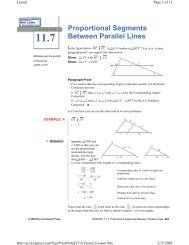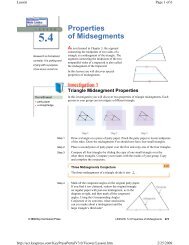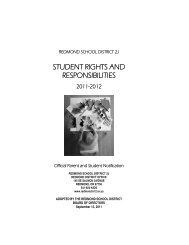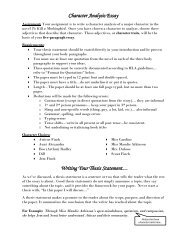Medieval Europe and the Ottoman Empire - Redmond School District
Medieval Europe and the Ottoman Empire - Redmond School District
Medieval Europe and the Ottoman Empire - Redmond School District
Create successful ePaper yourself
Turn your PDF publications into a flip-book with our unique Google optimized e-Paper software.
The Church also had great wealth, which made it an even more<br />
powerful institution. The Church earned income from property it<br />
owned. The wealth of <strong>the</strong> pope was greater than that of any individual<br />
<strong>Europe</strong>an monarch. Also, <strong>the</strong> Papacy’s authority was often greater<br />
than that of kings <strong>and</strong> emperors. The pope’s power caused many<br />
monarchs to cooperate with <strong>the</strong> Church, but it also caused conflict.<br />
What was <strong>the</strong> structure of <strong>the</strong> Church in <strong>the</strong> Middle Ages?<br />
Conflict Between Monarchs <strong>and</strong> <strong>the</strong> Papacy<br />
ESSENTIAL QUESTION Why did monarchs <strong>and</strong> popes struggle with each<br />
o<strong>the</strong>r for control of society?<br />
For a long time, Church leaders <strong>and</strong> <strong>Europe</strong>an monarchs <strong>and</strong> nobles<br />
saw that it was in <strong>the</strong>ir best interest to cooperate with each o<strong>the</strong>r.<br />
But <strong>the</strong>y eventually came into conflict. In <strong>the</strong> 11th century, a dispute<br />
between Pope Gregory VII <strong>and</strong> Emperor Henry IV reached a crisis point.<br />
One Cause of Conflict The Holy Roman <strong>Empire</strong>, which<br />
began around 962, included much of central <strong>and</strong> western <strong>Europe</strong>.<br />
Holy Roman Emperor Henry IV had built up political power by<br />
appointing Church officials. Monarchs such as Henry IV relied on<br />
literate <strong>and</strong> efficient Church officials to help run <strong>the</strong>ir kingdoms.<br />
They wanted as much control over those officials as possible. In<br />
1075, Pope Gregory said that laypeople—including Henry IV—<br />
could no longer appoint people to Church offices.<br />
The Outcome The pope’s decision made Henry<br />
furious. He called toge<strong>the</strong>r <strong>the</strong> bishops that supported<br />
him. Toge<strong>the</strong>r, <strong>the</strong>y declared <strong>the</strong> pope’s election invalid.<br />
Pope Gregory responded by excommunicating, or<br />
banishing, Henry from <strong>the</strong> Church for violating <strong>the</strong><br />
pope’s order. He told Henry’s subjects that he was no<br />
longer emperor, <strong>and</strong> <strong>the</strong>y did not have to obey him.<br />
Many nobles <strong>and</strong> church officials <strong>the</strong>n turned<br />
against Henry. Henry cleverly chose to ask <strong>the</strong> pope to<br />
forgive him. Some accounts say that to seek forgiveness,<br />
Henry stood barefoot for three days in <strong>the</strong> snow outside<br />
<strong>the</strong> castle where <strong>the</strong> pope was staying. As a priest,<br />
Gregory had to forgive Henry. Henry regained his title<br />
<strong>and</strong> control over his subjects, but conflict between<br />
<strong>Europe</strong>an monarchs <strong>and</strong> <strong>the</strong> Papacy would continue.<br />
Emperor Henry IV<br />
Seeks Forgiveness<br />
Emperor Henry<br />
kneels before<br />
Countess Matilda<br />
as Pope Gregory,<br />
dressed in red,<br />
looks on. Matilda is<br />
persuading <strong>the</strong> pope<br />
to forgive Henry. ▼<br />
Why was appointing Church officials important<br />
to Henry IV?<br />
<strong>Medieval</strong> <strong>Europe</strong> <strong>and</strong> <strong>the</strong> <strong>Ottoman</strong> <strong>Empire</strong> • 323








